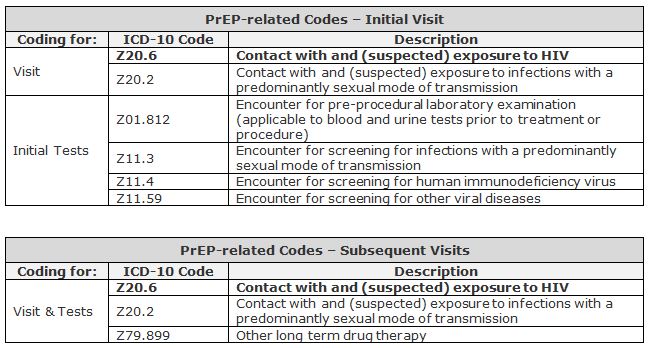No generic version of either drug is currently available, although generic emtricitabine and tenofovir disoproxil fumarate is anticipated to become available in 2021.
PrEP is for persons at ongoing risk of HIV infection. Persons who wish to prevent HIV infection after a potential single, high-risk event-- such as unprotected sex, injection drug use with needle-sharing, or sexual assault-- should be evaluated for non-occupational post-exposxure prophylaxis, or nPEP. nPEP must begin within 72 hours of the potential exposure. Learn more about nPEP on the CDC PEP website.
Which of my patients may benefit from PrEP?
Per CDC Guidelines, PrEP may be appropriate in the following populations, who also show signs of substantial HIV risk:
The State of Alaska Section of Epidemiology also recommends that clinicians discuss PrEP with the following HIV-negative patients:
- Those who have been prescribed non-occupational post-exposure prophylaxis (nPEP) for a previous HIV exposure and who demonstrate continued high-risk behavior, such as having used multiple courses of nPEP or having recurrent diagnosis of bacterial STD such as chlamydia, gonorrhea, or syphilis.
- Transgender persons engaging in high-risk sexual behaviors.
What are the guidelines for prescribing PrEP?
The Centers for Disease Control (CDC) has released PrEP guidelines on PrEP for the Prevention of HIV Infection in the United States. These guidelines, along with other resources for providers, can be found online at CDC's HIV Guidelines and Recommendations.
A summary of guidance for PrEP use includes:
![]()

The Clinical Providers’ Supplement contains additional tools for clinicians providing PrEP, such as a patient/provider checklist, patient information sheets, provider information sheets, a risk incidence assessment, supplemental counseling information, billing codes, and practice quality measures.
How should I bill for PrEP?
There are currently no official billing codes specific to PrEP. The following billing codes were compiled by the New York State Department of Health and New York City Department of Health and Mental Hygiene as recommended for PrEP-related outpatient services.

Visits: Z20.6 is generally considered an acceptable principal diagnosis/first-listed condition in the ICD-10 code system. If an insurer requires additional coding clarifying the patient's risk, Z20.2 (sexual risk exposure) or F19.20 (unspecified drug dependence) can be added.
Tests: Tests which are ordered to evaluate the patient for conditions potentially associated with long-term use of PrEP medications should include the code Z79.899 (other long term drug therapy).
What resources can assist my patients in paying for PrEP?
There are programs to help cover the cost of the PrEP medications. Each assistance program has varying eligibility criteria, and your patient may need your assistance in applying to these programs.
If you have a patient who may benefit from PrEP but needs help navigating PrEP assistance programs, you may also contact the Alaska HIV/STD Program by email at prepak@alaska.gov or call 1-907-269-8000 and ask to speak to someone from the HIV Program.
PrEP Trainings for Providers
- Pre-Exposure Prophylaxis for HIV: PrEPing Alaska Providers (mp4)
Recorded 11/20/2014, this presentation is intended for Alaskan clinicians, HIV prevention providers, health department staff, and others medical professionals with an interest in offering PrEP services. It provides a clinical introduction to pre-exposure prophylaxis (PrEP) for HIV, including an overview of PrEP efficacy, prescribing strategies, and systems to support PrEP implementation in Alaska. Presenters include Dr. Mark Thrun, Associate Professor, Division of Infectious Diseases, at the University of Colorado School of Medicine and HIV/STD Prevention and Control Director at Denver Public Health, and Terri Bramel, PA-C, Alaska Native Tribal Health Consortium, HIV Clinical Team. (mp4)- Recorded 11/20/2014, this presentation is intended for Alaskan clinicians, HIV prevention providers, health department staff, and others medical professionals with an interest in offering PrEP services. It provides a clinical introduction to pre-exposure prophylaxis (PrEP) for HIV, including an overview of PrEP efficacy, prescribing strategies, and systems to support PrEP implementation in Alaska. Presenters include Dr. Mark Thrun, Associate Professor, Division of Infectious Diseases, at the University of Colorado School of Medicine and HIV/STD Prevention and Control Director at Denver Public Health, and Terri Bramel, PA-C, Alaska Native Tribal Health Consortium, HIV Clinical Team.
- Integrating Pre-Exposure Prophylaxis for HIV Into Existing Services (mp4)
What you should know about PrEP - This presentation is intended for HIV prevention providers, counselors, case managers, health department staff, disease intervention staff, and medical professionals such as nurses with an interest in learning more about PrEP and possibly integrating PrEP referrals into their services. Presented by Dr. Oliver Bacon of the San Francisco Department of Public Health Center for Learning and Innovation and David Evans, Director of Research Advocacy for Project Inform, this webinar will provide attendees with the knowledge and skills they need to integrate PrEP for HIV prevention into their existing HIV counseling and risk reduction services. The webinar will include a brief clinical overview of PrEP, followed by an interactive discussion of strategies to integrate PrEP into HIV prevention and other social and healthcare services.
Additional Resources & Clinical Consultation
If questions arise, clinicians have two clinical consultation lines available. Both lines can also assist with PrEP prescribing:
- Alaska Native Tribal Health Consortium (ANTHC) HIV Clinical Consultation Line
1-888-855-8006 #2 or 1-907-729-2907
- National Clinical Consultation Center (CCC) PrEPline
1-855-448-7737, (Monday-Friday, 7:00AM – 2:00PM Alaska Time)
Information on prescribing PrEP can also be found on the following websites:
Contact Us
If you have questions about PrEP that are not answered on this website, please contact the Alaska HIV/STD Program by email at prepak@alaska.gov or call 907-269-8000 and ask to speak to someone from the HIV Program.
